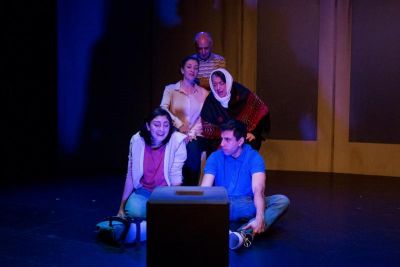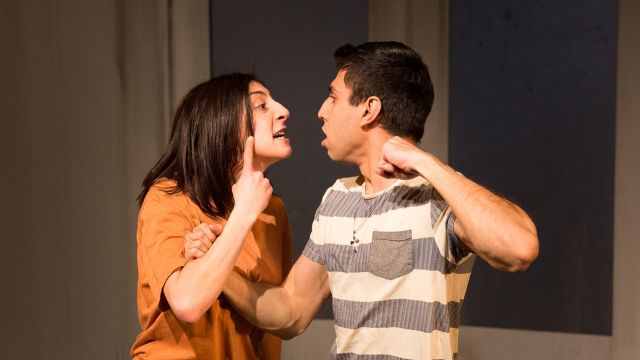Where the Streets Had a Name
“When your home is occupied and you have no right of return, you hold on to what you can: the key to the front door; the title deeds to your land; a jar of soil”.
In this sentence from her program notes, Eva Di Cesare defines the essence of Randa Abdel-Fattah’s novel – just as her perceptive adaptation and deft direction capture the novel’s messages of the personal/political effects of occupation, violence and injustice.
A grey wall, symbolising the divisiveness of occupation, is the backdrop of Antoinette Barbouttis’ stark, suggestive set. On to it, projected images take the audience to happier times – and times much less so. Three cubes become tables, seats and a TV set. A set of stairs transforms to a bus. The simplicity of the set emphasises the emptiness of loss while providing the opportunity for the quick and effective changes between the scenes into which the novel has been transformed.

Di Cesare’s writing is economic, evocative in its austerity, yet her characters are complex, reaching into to the hearts and consciences of their audience without being too didactic. Her direction of the action is concise and explicit, sustaining pace and lightness without losing impact or implication.
Aanisa Vylet is outstanding as thirteen-year-old Hayaat. She encapsulates the restlessness and vivacity of the teenager mixed with the draining effects of uncertainty and trauma. Vylet brings depth and understanding to the character, her energy and expressive reactions making Hayaat very real and appealing.
Dina Gillespie is equally appealing as her mother, mixing the exasperation of dealing with a family with the despair of losing her home and the attempt to sustain some semblance of normality. Gillespie also plays a number of support roles.
Alissar Gazal returns to the Parramatta stage as Hayaat’s grandmother, Sitti, who yearns for her home in Jerusalem. Gazal finds the necessary balance between loving matriarch and the wistfulness of age and regret in this role. In another role she uses her effective comic timing as a rakish bus driver.
The male roles are played by Sal Sharar and Mansoor Noor.

Sharar is patiently stolid in the role of Hayaat’s father, Baba. Despite the loss of his one hundred tree olive grove and the uncertainty of life in a small apartment in Bethlehem, he tries for some semblance of balance in the midst of recurring curfews. In other roles he plays a bus driver, a rather over-optimistic taxi driver – and for two short scenes he loses years as a young, naive soccer player.
Mansoor Noor also drops years to play both Hayaat’s younger brother Tariq – and her displaced friend Samy, with whom she ventures ‘over the wall’ to fill a jar with soil from Jerusalem for Sitti. Noor is convincingly youthful and engaging in both roles, especially finding the different nuances of fear and excitement needed to make the crossing into Jerusalem seem forbiddingly real.
Di Cesare brings them together in scenes that speak clearly and compassionately yet sustain a pace that accentuates the stress and insecurity of the lives of those, such as this Palestinian family, who cannot return to their homeland. She has moved Abdel-Fatah’s novel from the page to a play will share her moving story with an even wider audience.
Carol Wimmer
Photographer: Michael Bourchier
Subscribe to our E-Newsletter, buy our latest print edition or find a Performing Arts book at Book Nook.

